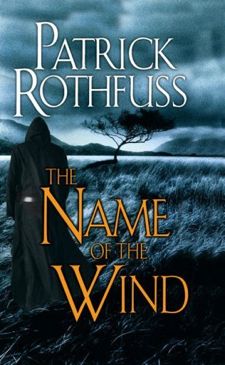I have a story I like to tell about my first encounter with Patrick Rothfuss and The Name of the Wind. Pat knows which story this is, and he’s probably even now putting his hand to his forehead and thinking, “Oh God, not this story again,” but for the rest of you it might be new, so here goes.
In 2007 I was on tour for my novel The Last Colony, and at the Minneapolis stop, the folks at Uncle Hugos, where I was doing my signing, told me a new author had left behind a signed book for me. Then they proceeded to use a crane to drag out this monster of a book called The Name of the Wind. It was huge, we’re talking elk-stunning huge, and since I had everything for a three-week tour in a single carry on (if you give airlines dozens of chances to lose your luggage, they will), I had no place to pack the thing. I had to carry the thing around.
And, well, I thought. If I have to carry the damn thing, I might as well read it. So I started reading, and there, on page four—of a book that started on page three, mind you, were five bowls of stew.
Oh, crap, I thought. Not a “hearty stew” fantasy! Stew being the most cliche of all fantasy world meals, as duly noted in Diana Wynne Jones’s entirely merciless tour of fantasy cliches, The Tough Guide to Fantasyland (“you may shortly be longing passionately for omelette, steak or baked beans, but none of these will be forthcoming, indoors or out.”) Honestly, if on the second page of the story you’re already trotting out the stew, what possible hope does the rest of the book have?
I’m going to be honest and note that as a reader I’m harder on fantasy than I am on science fiction; it’s easier for me to forgive sloppy world building in latter than the former. There’s no logical reason for it; it’s just where my biases lie.
So I almost stopped reading Wind right there. But then I realized that if I stopped reading it, I’d still have to lug its elephantine bulk around. I couldn’t just ditch the thing. That Rothfuss character signed it to me. It was like giving me a puppy. So, fine, I thought, I’ll give this thing one more chance….
And the next time I look up I’m two tour stops down the line.
I want to stress how remarkable this was. After the “stew incident” I was actively looking for the Potempkin moment in his world building when I could declare the game over and give up. I didn’t find it. After a while I stopped looking for it. And after that I had begun started being sad that I was coming to the end of the book and then there would be no more book to read, just when I was totally into it.
Stupid Patrick Rothfuss. He could have given just one more obvious cliche and I wouldn’t have had to get sucked in. But he didn’t, the rotten bastard.
(Well, except for his hero Kvothe being one of those red-haired hyper-competent types. But speaking as one of those poor schmucks who got branded as a “New Heinlein”: In fantasy and science fiction, you just have to live with red-haired hyper-competents.)
I do take comfort in the fact I’m not the only one who got so completely sucked into Pat’s world. The Name of The Wind has become arguably the greatest success story in fantasy fiction in the last five years. Why? Well, because great story, great characters, and great writing craft really do still matter, enough so that some of Pat’s readers have become surly that the second book in the series, The Wise Man’s Fear, took four more years to get published. I sympathize, but I’ll tell you what: I wouldn’t want Kvothe’s adventures quicker and sloppier. I fell hard for Pat’s world, and building a world like that isn’t something you just bang out. It’s worth the wait.
I will say this, however. When Pat’s publisher sent me an ARC of The Wise Man’s Fear, the first thing I did (that is, after taking a picture of it and putting it online so I could taunt everyone who didn’t have one yet, bwa ha ha ha hah ha!) was to crack it open at random and see what was happening on that page.
And what was happening on that page? Someone was passing out bowls of stew. I swear to God.
Sorry, Pat. I’m not falling for your stew trick a second time. I’m just going to keep reading. That’ll show you.
John Scalzi’s first published novel Old Man’s War was a finalist for the Hugo Award, took first place in the Tor.com Best of the Decade Reader’s Poll, and won him 2006’s John W. Campbell Award for Best New Writer; since then, he has published five more novels. Your Hate Mail Will Be Graded: A Decade of Whatever, 1998-2008, a collection of essays from his popular weblog The Whatever, won the Hugo for Best Related Work in 2009. He is currently serving as president of the Science Fiction Writers of America.










